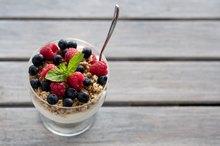What does fact checked mean?
At Healthfully, we strive to deliver objective content that is accurate and up-to-date. Our team periodically reviews articles in order to ensure content quality. The sources cited below consist of evidence from peer-reviewed journals, prominent medical organizations, academic associations, and government data.
The information contained on this site is for informational purposes only, and should not be used as a substitute for the advice of a professional health care provider. Please check with the appropriate physician regarding health questions and concerns. Although we strive to deliver accurate and up-to-date information, no guarantee to that effect is made.
How to Stop Weight Loss on Vyvanse
Vyvanse is a central nervous system stimulant used to treat symptoms of attention-deficit hyperactivity disorder, or ADHD 2. Side effects can include trouble sleeping, dry mouth, nausea, diarrhea, anxiety and loss of appetite. You can prevent unwanted weight loss due to loss of appetite by keeping your calorie intake constant and choosing the right foods.
Consume frequent small meals instead of two or three large meals to add extra calories to your diet.
Foods Prediabetics Should Eat & Avoid
Learn More
Eat healthful foods like whole grains, fruits and vegetables, low-fat milk and dairy products, lean protein sources, nuts and seeds. Don't try to maintain or gain weight by eating unhealthy, high-calorie, high-fat foods.
Consume heavy, thick breads like whole wheat or pumpernickel, which have more calories, according to the University of Illinois at Urbana-Champaign.
Anti-Inflammatory Foods List
Learn More
Increase healthy fats like corn oil margarine, olive and canola oils, peanut butter and salad dressings made with olive oil. Limit saturated fats.
Drink smoothies or shakes made with milk or juice. Sprinkle in some ground flaxseed, recommends MayoClinic.com. Flaxseed is high in fiber and omega-3 fatty acids.
Choose apple, cranberry, cranapple, grape, pineapple or apricot juices. They have more calories than grapefruit, orange and tomato.
Eat healthy, calorie-dense snacks. MayoClinic.com recommends nuts, peanut butter, cheese, dried fruits and avocados.
Try adding calorie-dense foods to traditional recipes. For instance, add cheese to casseroles, salads, sandwiches or scrambled eggs.
Choose sweets that also contain nutrients, such as bran muffins or yogurt.
Exercise regularly. Exercise can stimulate your appetite and strength training can build muscle, adding weight.
Warnings
Do not drink fruit juice at the same time you take Vyvanse because it can cause your body to absorb less of the drug.
Related Articles
References
Warnings
- Do not drink fruit juice at the same time you take Vyvanse because it can cause your body to absorb less of the drug.
Writer Bio
Erin Beck began writing professionally in 2008 as an opinion columnist for the West Virginia University student newspaper, "The Daily Athenaeum." She has worked in health promotion at the university and as a communications intern at the National Alliance on Mental Illness. She has a Bachelor of Science in journalism and a Master of Public Health, both from West Virginia University.









